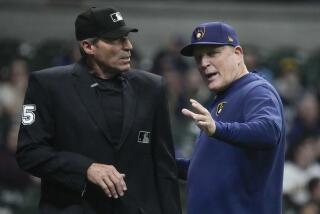A Supreme Court Ruhle : Balboa Island Umpire Has the Final Say Over the World’s Best Tennis Professionals
- Share via
Never mind the drawing power of the marquee, or the multimedia exposure, the final say on the tennis court comes from the Bill Ruhles of the world, not from the McEnroes, Lendls and Connors.
Ruhle, one of 28 U.S. officials accredited by the Men’s International Professional Tennis Council to work as an umpire worldwide, enjoys the position of overlooking the world’s finest players, even when the chair becomes one the most highly visible seats in a heated match.
“There’s an awful lot of focus on you out there, so you can’t screw up,” said Ruhle, a 49-year-old marketing consultant from Balboa Island. “Sure it’s stressful, but I like the stress. I kind of thrive on it.”
Ruhle has had run-ins with some of the game’s elite and not-so-elite, but Pro Council restrictions prevent him from discussing the altercations. Council rules also prevent officials from fraternizing with players.
“We can’t get too close to them,” Ruhle said. “If you do, you’re gone.”
Ruhle, who also serves as a national evaluator of officials for the United States Tennis Assn., said he has noticed officials growing less and less tolerant of player outbursts.
“They’re still arguing calls and sure, some bad ones are still made, but the days of officials being harassed are almost over. It’s not fair to the other guy involved in the match, the one who’s not complaining.
“The officiating has come a long way. It used to be just guys out of the stands.”
How does Ruhle keep order?
“Well, I’m 6-foot-2 and 225 pounds, so I’m as big or bigger than most of them,” he said. “At least I look kind of intimidating out there. But I’ve been around long enough so they know I don’t put up with too much harassment from anybody.”
He also can endure the tour’s schedule in which he works about two to three weeks at a time. Ruhle has yet to work an overseas match, but the U.S. schedule keeps him crisscrossing the country at a pace he describes as grueling.
“You start with working the qualifying rounds and then you might hop on a plane to work more qualifying somewhere else before coming back to do the main draw of where you were before,” he said.
“You go all day and most of the time into the evening. In the early rounds you start at about 8 in the morning and sometimes you don’t plop down in your hotel room again until about midnight or 1 a.m. During a five-set match, the umpire is up there for three, sometimes four hours. They change the linesmen every 45 minutes, but they can’t change the ump.”
With his Pro Council accreditation, Ruhle works men’s singles matches almost exclusively. But his first experience with the rigors of a pro tour came in 1978, when he served as the head official for the Women’s Tennis Assn. tour, a roadshow that “was like the old carnival days,” he said. “You were living out of the trunk of your car.”
Ruhle said his rise through the officiating ranks has mirrored the growth of the sport.
In 1975, with the Virginia Slims tour in its infancy, Ruhle worked a Slims stop in Mission Viejo. As a member of the Mission Viejo Tennis Club, Ruhle was helping organize the event and when officials were needed, he climbed into the umpire’s chair for the first time.
“I think it was Betty Stove vs. Virginia Wade,” he said. “They needed umpires and linesmen. So, I did a couple of matches and the next thing I knew I was doing Billie Jean King vs. Chris Evert.”
He then joined the Southern California Tennis Umpires Assn. and began working club matches. He worked the Davis Cup qualifying in Los Angeles in 1977, and soon thereafter joined the women’s tour.
“I kind of moved through the levels pretty quickly,” Ruhle said. “I got lucky I guess.”
In 1981, he was invited to the Pro Council’s umpire training school in Dallas, where he received his international accreditation. Later that year, Ruhle worked his first U.S. Open at the National Tennis Center in New York City.
It marked a kind of homecoming for Ruhle, who grew up in Forest Hills, N.Y., site of the Open until 1978.
Ruhle worked as a ballboy at Forest Hills. But his friends tried to talk him out of tennis.
“Back then, if you wore white shorts and ran around on a tennis court, you were considered a sissy,” he said. “So, I started playing football and basketball, but I always liked tennis. Years later, I realized if I couldn’t play it well enough, this (umpiring) would be the next best thing.”
The high point of Ruhle’s umpiring career may come this summer. He’s applied to work the chair at Wimbledon.
“For most umpires, and even most pro tennis players, Wimbledon is the pinnacle,” Ruhle said. “It’s great to go back and work the Open, but Wimbledon would be my return to Oz.”
More to Read
Go beyond the scoreboard
Get the latest on L.A.'s teams in the daily Sports Report newsletter.
You may occasionally receive promotional content from the Los Angeles Times.









